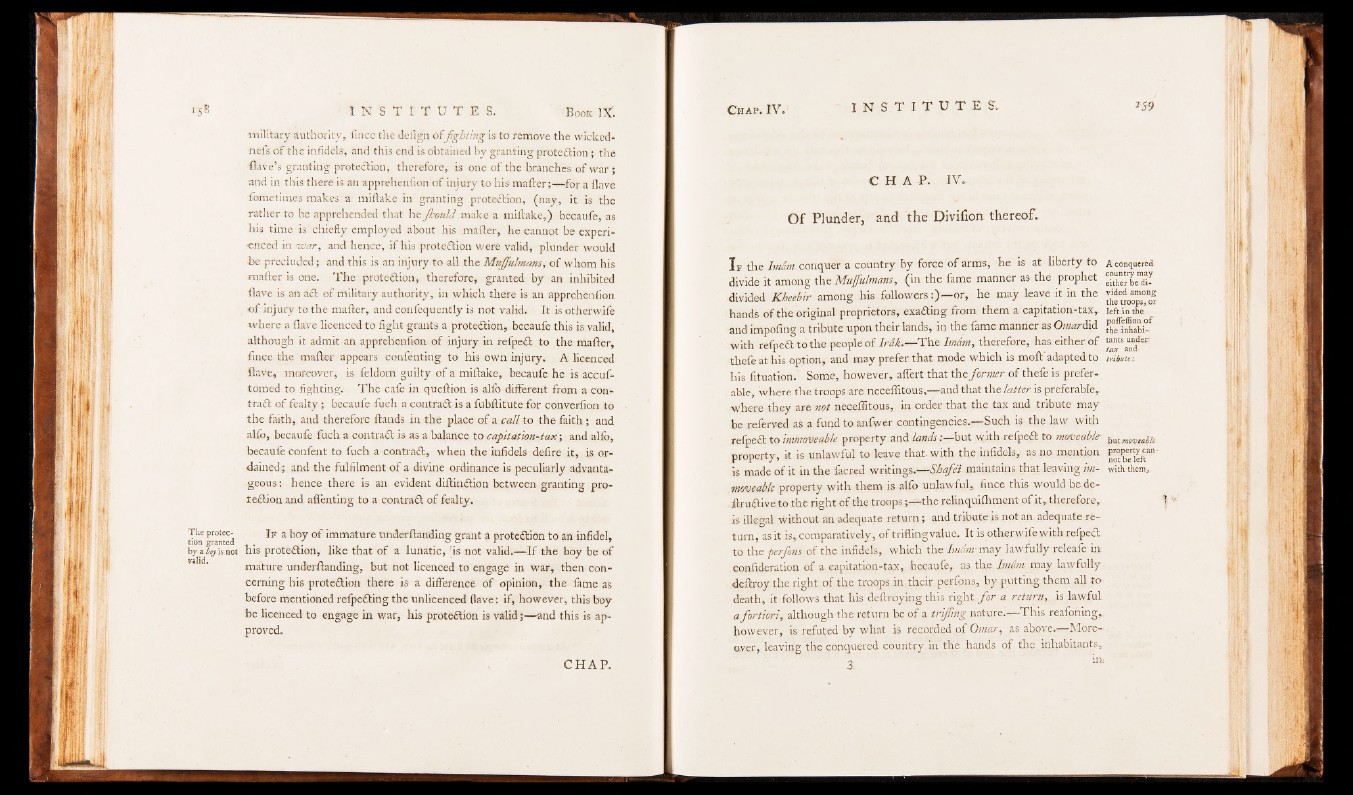
15B
military authority, fince the defign oîfighting is to remove the wicked*
nefs of the infidels, afid this end is obtained by granting protection ; the
ttave’s granting protection, therefore, is one of the branches of war ;
and in this there is an apprehenfion of injury to his matter;— for a Have
fometimes makes a mittake in granting protection, (nay, it is the
rather to be apprehended that he Jhonld make a mittake,) becaufe, as
his time is chiefly employed about his matter, he cannot be experi*
«need in war, and hence, if his protection were valid, plunder Would
■ be precluded ; and this is an injury to all the Mujfiulmans, of whom his
matter is one. The protection, therefore, granted by an inhibited
Have is an aCt of military authority, in which there is an apprehenfion
o f injury to the matter, and confequently is not valid. It is otherwife
where a tlave licenced to fight grants a protection, becaufe this is valid,
although it admit an apprehenfion of injury in retpeCt to the matter,
fince the matter appears confenting to his own injury. A licenced
Have, moreover, is feldom guilty of a mittake, becaufe he is accuf-
tomed to fighting. Thé calé in quettion is alfo different from a contract
of fealty ; becaufe fuch a contract is a fubftitute for converfion to
the faith, and therefore Hands in the place of a call to the faith ; and
alfo, becaufe fuch a contract is as a balance to capitàtion-tax ; and alfo,
becaufe confent to fuch a contract, when the infidels defire it, is ordained;
and the fulfilment of a divine ordinance is peculiarly advantageous:
hence there is an evident diftinCtion between granting protection
and alfenting to a contract of fealty.
The protection
granted
by a boj is not
valid.
I f a boy of immature underttanding grant a protection to an infidel,
his protection, like that of a lunatic, is not valid.— If the boy be of
mature underttanding, but not licenced to engage in war, then concerning
his protection there is a difference of opinion, the fame as
before mentioned refpeCting the unlicenced {lave: if, however, this boy
be licenced to engage in war, his protection is valid ;— and this is approved.
C H A P .
C H A P . I V . .
Of Plunder, and the Divifion thereof.
I f the Imtim conquer a country By force of arms, he is at liberty to Acanquered
divide it among the Muffulmans, (in the fame manner as the prophet
divided Kheebir among his followers : ) - o r , he may leave it in the
hands of the original proprietors, exacting from them a capitation-tax,, left in the
and impofing a tribute upon their lands, in the fame manner as Omardid
with refpeCt to the people of Ir&k.— The Imam, therefore, has either o f ^ tsa“”dder
thefe at his option, and may prefer that mode which is moft adapted to tnbute:.
his fituation.' Some, however,, aflert that the former of thefe is preferable,
where the troops are neceflitous,— and that the latter is preferable,
where they are not neceflitous, in order that the tax and tribute may
be referved as a fund to anfwer contingencies.— Such is the law with
refpect to imdioveable property and lands:—but \yith refpeCt to moveable- but mou table
property, it is unlawful to leave that, with the infidels,, as no mention
is made of it in the facred writings.— Shafei maintains that leaving im- with them,.
moveable property with them is alfo unlawful, fince this would be de-
. ftruCtive to the right of the troops;— the relinquifhment of it, therefore,
is illegal without an adequate return; and tribute is not an. adequate return,
as it is, comparatively, of trifling value. It is otherwife with refpeft
to the perfons of the infidels, which the Imdm-may lawfully releafe in
confideration of a capitation-tax, becaufe, as the Imam may lawfully
dettroy the right of the troops in their perfons, by putting them all to
death, it follows that his deftroying this right, fo r a return,, is lawful
a fortiori, although thereturo be of a trifling nature.— This reafoning,.
however, is refuted by what is recorded .of Omar, as above.-—Moreover,
leaving the conquered country in the hands of the inhabitants,